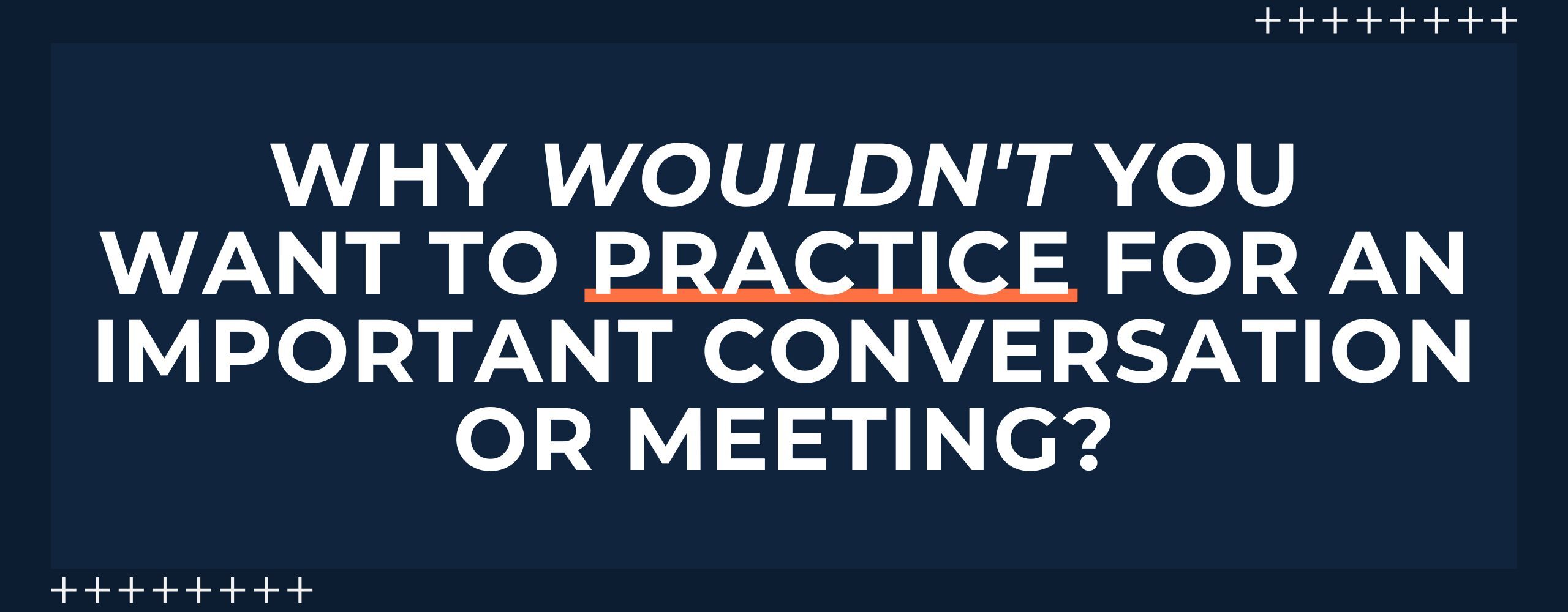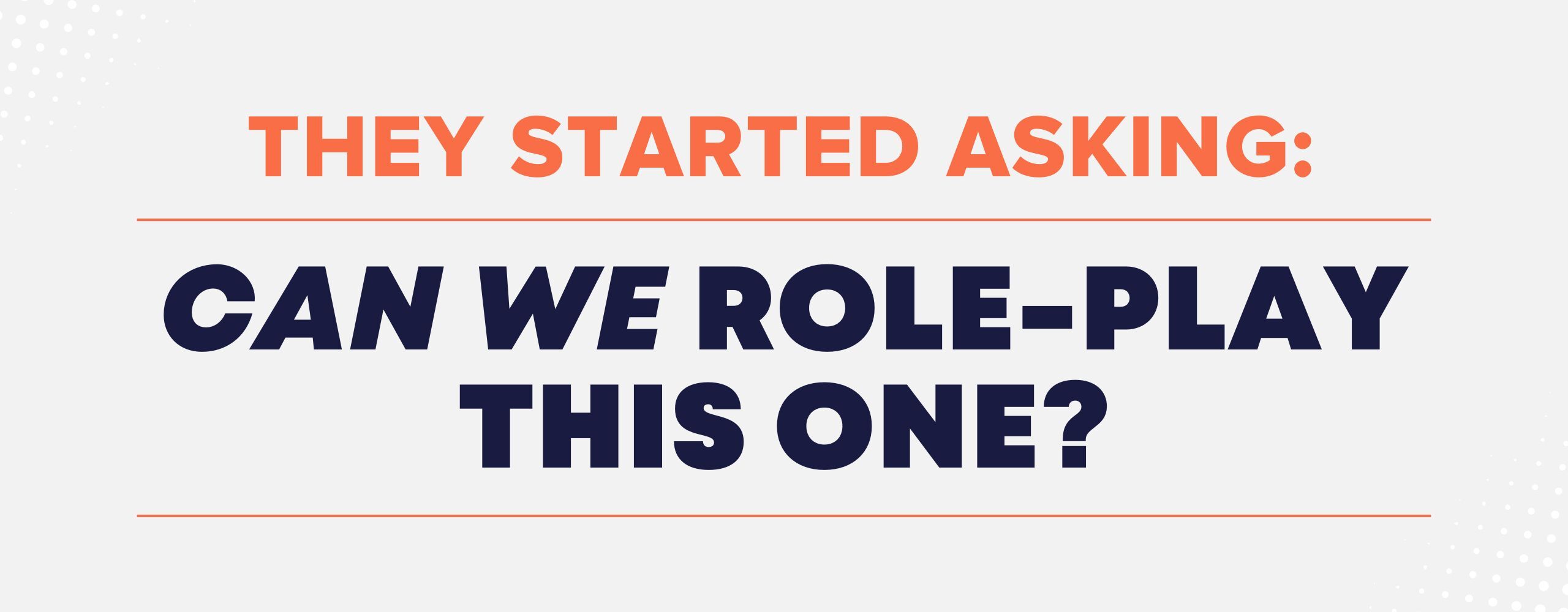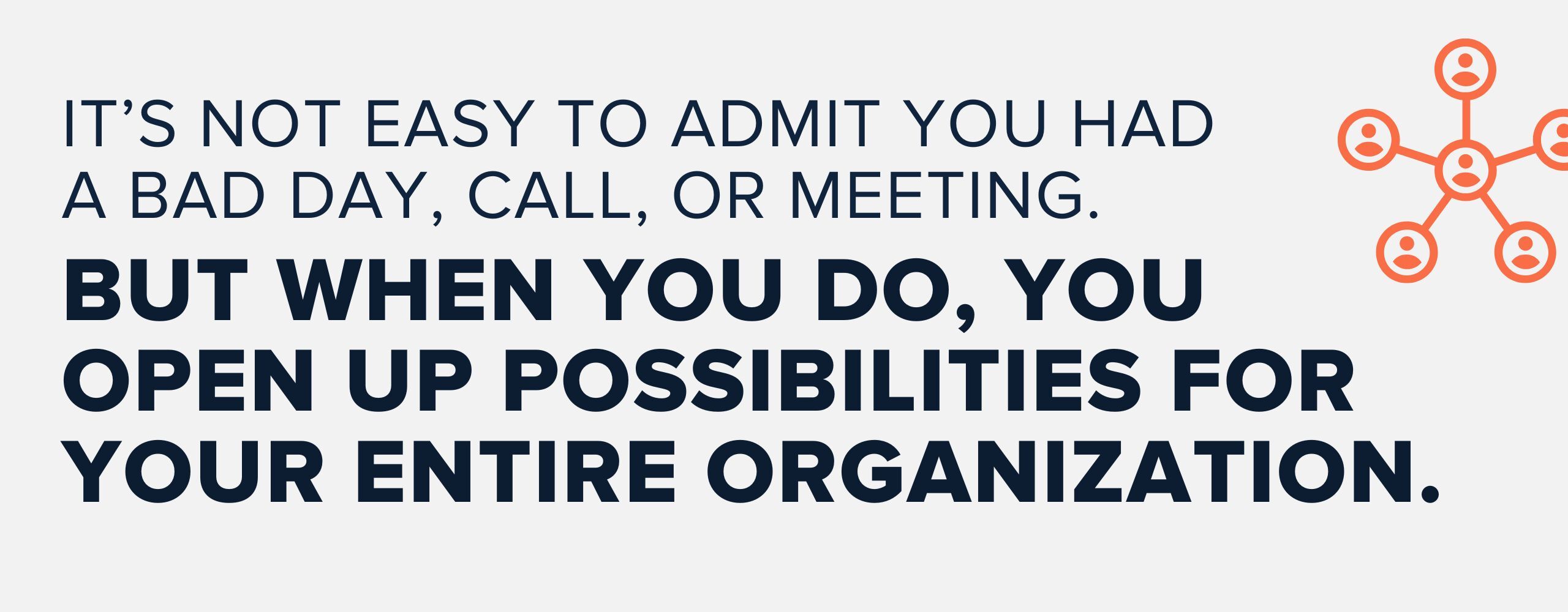Join 40,000+ sales and marketing pros who receive our weekly newsletter.
Get the most relevant, actionable digital sales and marketing insights you need to make smarter decisions faster... all in under five minutes.
Want to Win More and Improve Company Culture? Do More Role-playing

Nov 9, 2022

Role-playing gets a bad rap.
To many, the very word conjures up images of improv theater or awkward team-building exercises in high school.
But, when you think about it, why wouldn't you want to practice for an important conversation or meeting? After all, we all do it in the bathroom mirror, right?
Role-playing takes your rehearsal out of the bathroom and adds additional elements of realism, while still providing a low-stakes trial run.
Indeed, when implemented well, role-playing can be an invaluable tool for growth for professionals of all types. And it’s time we get over ourselves and commit to being better.
Why would you practice when money’s on the line?
The strongest argument I can give for role-playing is this: Why wouldn't you want to practice when money’s on the line?
When you’re actually meeting with a client or trying to get a deal to close, is that the time you want to be fumbling with your slidedeck or searching for the right data?
Of course not.
While a role-play won’t allow you to anticipate every twist and turn a meeting will take, you can be on top of your game if you’ve rehearsed ahead of time.
But the benefits of role-playing extend far beyond the obvious financial ones — and they get to the very heart of what separates good companies from great ones: strong company culture.
Committing to role-playing means committing to growth
Not too long ago, I was giving a talk to a group of general contractors. These are folks who lead work on major building projects like condo complexes and commercial development.
The night before my talk, I had dinner with a dozen or so of them. We sat around talking about the industry and what was coming in the future, but the talk soon turned to challenges they were facing. One after the other, someone would say something like, “Hey Marcus, I had a challenge when a client wanted X after we had agreed upon Y” or “Marcus, how should I handle it when Z happens?”
With each question, there were nods around the table. Everybody was facing the same challenges.
As I offered my advice in each case, something happened. These GCs started asking: Can we role-play this one?
And so we did.
In front of their peers and in front of me, they were ready to be vulnerable, to make mistakes, and — most of all — to learn. 
And so, rather than just hear my thoughts, we acted it out. Time and time again. Beyond the first few minutes, no one felt silly or stupid. Everyone was bought in and paying close attention.
And I could tell the lessons were going to stick.
Building a culture of role-playing: 6 steps to take
Studies show that new sales hires will retain just 16% of all sales training they receive. Role-playing provides the chance for higher retention and steady improvement.

But because role-playing gets so many eye-rolls, you have to be strategic with how you embed it in your company culture.
Here’s how:
1. Start with the sales managers
While every employee can benefit from role-playing, the sales department will give you the most bang for your buck. These are the employees with money on the line, and they will benefit the most from role-plays and rehearsals ahead of meetings.
So, start with the sales manager. Ask them to schedule one role-play per month with each sales rep. If that’s too many, try for one per quarter.
Have the manager and the salesperson alternate between playing the role of “seller” or “buyer.”
2. Don't make role-plays punitive
For true learning to happen, role-plays can’t be seen as punitive evaluations. When you’re nervous, you’re not going to do your best and you won’t be in a position to learn.

Just like in an athletic practice, you want people to bring their best, but you don’t want them to feel like their job is on the line if they make mistakes. Just the opposite. You want the mistakes to happen in the role-play, not in the actual sales meeting.
In order for that to happen…
3. Leaders must model vulnerability
If you want your employees to feel comfortable making mistakes, then leaders have to make mistakes first. This normalizes the growth mindset you’re looking to foster.

A newer employee is likely to see a role-play as an evaluation instead of a learning opportunity — until they see a leader being okay making mistakes in front of others.
Leaders, it’s on you to be comfortable with vulnerability.
4. Be clear about outcomes
Sometimes a role-play will feel more like a polished rehearsal. You’re prepping for a meeting and want everything to go right.
In other cases, it’s more like a rough draft. Sort of a “Let’s role-play how to respond when a prospect has an objection about price”-type thing.
Both are important. But all participants should be clear about what they’re looking for before they begin.
5. Practice, but don’t be rigid
Practice makes perfect, but perfect sometimes sounds wooden and inauthentic. Role-plays are about developing comfort and building skills, not mapping out a screenplay in which your buyers are a character.

As you work through role-plays with your team, be clear that adaptability and creativity are essential. You don’t ever want to train so much that your responses sound canned and phony.
6. Focus on getting the reps
Professional basketball players look so comfortable knocking down free throws because they practice that shot hundreds of times each week. So, when the lights are on and the crowd is screaming, they can step up and calmly take a shot.
When you normalize role-plays, you’re getting your people the reps they need to stay cool and collected in the moments that matter. The more reps they take, the more confident they’ll be when the moment comes.
What a 'role-play culture' looks like in practice
A few months ago a colleague of mine shared a video. This is a member of our senior leadership team — a sought-after coach who has advised hundreds of business leaders.

He posted a video of a session he had with a client that went poorly. As he was processing what he could do to improve, he was seeking the feedback of others.
It’s not easy to admit you had a bad day, a bad call, a bad meeting. But when you do, you open up possibilities for your entire organization. Suddenly, every employee, from the C-suite to the bottom of the ladder, sees that everyone struggles sometimes.
This colleague would not have shared this video if we did not have a healthy role-play culture at IMPACT — a culture of feedback, vulnerability, and growth.
But it is those very elements of our culture that have allowed this and other colleagues to develop the skills they have now.
This is how organizations can achieve collective improvement — and how good companies become great.
If you want to learn more about how role-playing can help your business thrive, join us for a free consulting session. Each month, we meet with business leaders to help them solve problems. Come and join!
Free Assessment: